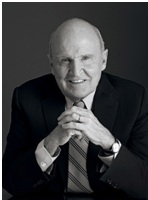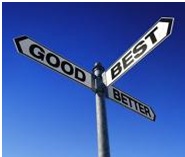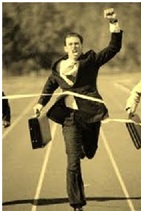|
 |
|
 |
|
|
||
Jack Welch Leadership and Business Success
Jack Welch (1935- )
American boss (pictured right) of General Electric (GE) 1981-2001, founded by Thomas Edison (pictured right below) and producer of light bulbs, aircraft engines, plastics and electricity generators. Time magazine’s manager of the twentieth century for transforming GE into the world’s best and most valuable company.
What are his tips about leadership and business success? 1. “Control your destiny or someone else will” If you don’t keep on satisfying customers, they will buy from your competitors and people will lose their jobs. “The company can’t give job security only customers can”, he said.
2. “Change or die” Keep on changing and improving before customer dissatisfaction forces you to (see point 1). It is better to change early when it is still painful (“painful opportunism”). Always challenge people to:
He wanted GE to have the creativity and flexibility of a small company, and so a leader’s job is “to create, not to control”, he said.
3. Work-Out This was the system that Welch introduced to challenge managers. Their actions were openly challenged and scrutinized by:
4. Vision and purpose He clearly communicated his vision of a customer oriented, world-class global company. On arrival as chief executive, he told employees: “I want a revolution” because of the value he placed on big changes.
5. Ruthless and decisive Nicknamed “Neutron Jack” by the press (the neutron was a nuclear weapon), he reduced GE’s workforce by 118,000 between 1980 and 1985 to make the company:
His policy was to “fix, close or sell” any business which was not number one or two in the world. 6. “Tough love” and honesty The best leaders have the 4 E's:
These attributes are reflected in his philosophy of “tough love” i.e. you have to be:
Each year he fired the bottom 10% of employees (as GE still does) to encourage high performance from the people remaining. “You’ve got to be hard to be soft”, he said. 7. Empowerment and good people He encouraged employees to: a) take responsibility (for achieving the objectives that managers set them). b) be high performers. (and technically competent). c) work effectively in teams. d) believe in the company’s values. (customer orientation, integrity, empowerment, quality, globalization and a passion for change and excellence).
8. The “boundaryless organization” This means making the organization more open and communicative by:
9. Be realistic
10. Learning He made GE into a learning organization that learns from other companies and its own successes and failures. So he strongly supported:
11. Competitive advantage Make sure you are better than your competitors on image, price and quality. So in the mid-1990’s he successfully introduced:
“If you don’t have a competitive advantage, don’t compete”, he said. 12. Speed Products must be developed and sold to customers as quickly as possible. So managers must:
“Do it faster next time”, he always told them.
13. Measure performance He said only three things need measuring in any business:
14. The will to win Like the company he created, he is incredibly competitive and determined to be the best, successfully overcoming the handicap of a slight stutter. His mother taught him to love success but cope with failure.
Key quotes on change Change before you have to. Change or die Control your destiny or someone else will.
Key quote on customers The company can’t give job security only customers can.
Key quotes on competitive advantage If you don’t have a competitive advantage, don’t compete. An organization’s ability to learn, and translate that learning into action rapidly, is the ultimate competitive advantage.
Key quote on selection Getting the right people in the right jobs is a lot more important than developing a strategy
Key quote on leadership Before you are a leader, success is all about growing yourself. When you become a leader, success is all about growing others.
|
|
|
||
|
|
||
| Copyright © wisdomtowin.com 2025 All Rights Reserved | ||
|












